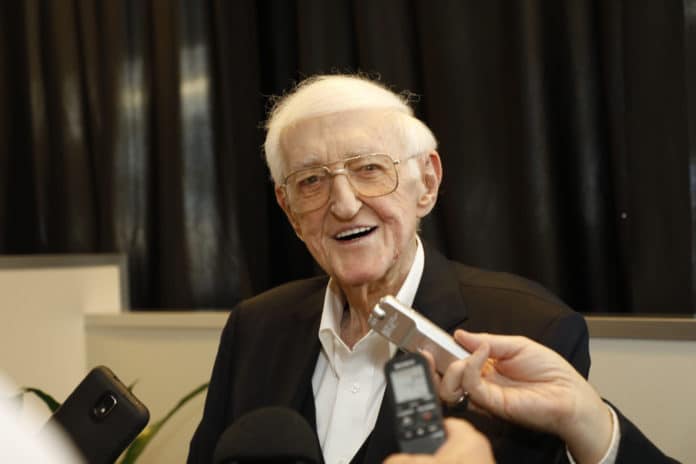Dan Jenkins, Fort Worth’s all-time best claim to writing fame, provided at least one last time, this time at his funeral, a chance to celebrate and honor writing. Good writing. Great writing.
Jenkins, who died March 7 at 90, had a funeral worth remembering. It was a time for more laughter than tears and a time for folks to remember the legendary sports writer’s kindness to those who sought his advice on the practice of his craft.
Many aspiring and, yes, even accomplished journalists were so in awe of him they dared not approach him until, well, until they did.
He welcomed them and after meeting them might invite them to a one-on-one to discuss writing. Sure, they talked sports but it was writing that held center stage.
Much has been written about the incomparable sports staff assembled by Blackie Sherrod at the old Fort Worth Press. Virtually all of those who worked there established themselves as terrific writers in spheres beyond The Press and beyond Fort Worth. Dan Jenkins, of course. Sherrod. Bud Shrake. Gary Cartwright. My local favorite and the only one still living from that staff: Jerre Todd. He went on to public relations but Todd could write.
Some say if he had stayed in journalism he might have eclipsed some of his Press teammates.
What has gone largely unwritten is an ode to the staff that made Sports Illustrated a must-read when Jenkins worked there. There has been no greater collection of magazine writers under one roof than the group that lit up SI’s pages in the 1960s,’70s and even into the ’80s. Perhaps only The New Yorker has boasted more great writers over a longer period of time.
If you liked sports, and especially if you liked bright and brilliant writing, you could not wait for Sports Illustrated to arrive at the newsstand or your mailbox. It featured an eye-popping roster of writing all-stars. Frank Deford on everything. Mark Kram on boxing. Bill Nack on horse racing and several other subjects. The novelist Tom McGuane wrote for Sports Illustrated. And, briefly, there was Kurt Vonnegut. There were and have been many others.
It was Deford who wrote the memorable line about being praised as a great sports writer. He said it was like being called “the world’s tallest midget.”
Good writing is good writing. Obituaries in The New York Times have been proof of that for decades and decades.
Jenkins changed how games were reported but more than that he set a new standard for high quality and descriptive writing about sports. His style became one to try to mimic, especially in football – college football, to be precise. He cast a lyrical, poet’s eye on Saturdays at places such as Ann Arbor, Michigan, and the University of Michigan Wolverines and Norman, Oklahoma, where the Sooners made gridiron history.
He was a man who loved fried chicken and chicken-fried steak with lots of cream gravy but he could bring out the fine china and delicate wine glasses and serve up a mouthwatering chateaubriand when he sat down to cook up a story at the typewriter.
My longtime fear is not how the digital age has affected everything from magazines to newspapers and even how we shop. My fear is that as a society we are losing the appreciation and availability of good writing.
You can still find some locally. The Business Press often has some. Gil LeBreton, a former Star-Telegram sports columnist and a fine writer himself, has assembled some damn fine writers at his new online sports newspaper, PressBoxDFW. We now link to stories and columns from PressBox in our daily Business Press newsletters.
Jenkins’ daughter, Sally, a columnist for the Washington Post, can write the hell out of a story. Maureen Dowd of The New York Times might get your goat politically but, man, can she write.
One of the best pieces of journalism ever written was Bill Nack’s story about the passing of the magnificent racehorse Secretariat.
Here’s an excerpt:
“…. and, finally, I told about that magical, unforgettable instant, frozen now in time, when he had turned for home, appearing out of a dark drizzle at Woodbine, near Toronto, in the last race of his career, twelve in front and steam puffing from his nostrils as from a factory whistle, bounding like some mythical beast out of Greek lore.”
The eulogies and the newspaper columns about Dan Jenkins helped remind us of his special qualities as a person and a craftsman. He was one of a kind. They also reminded us of the importance of the written word, the well-turned phrase, the beauty of a single sentence here and there.
His legacy of outstanding writing, reminding us in every word of the power and value of good writing, will be among the most important gifts he left to us, almost as if in his will.
Richard Connor is president and publisher of the Fort Worth Business Press. Contact him at rconnor@bizpress.net






